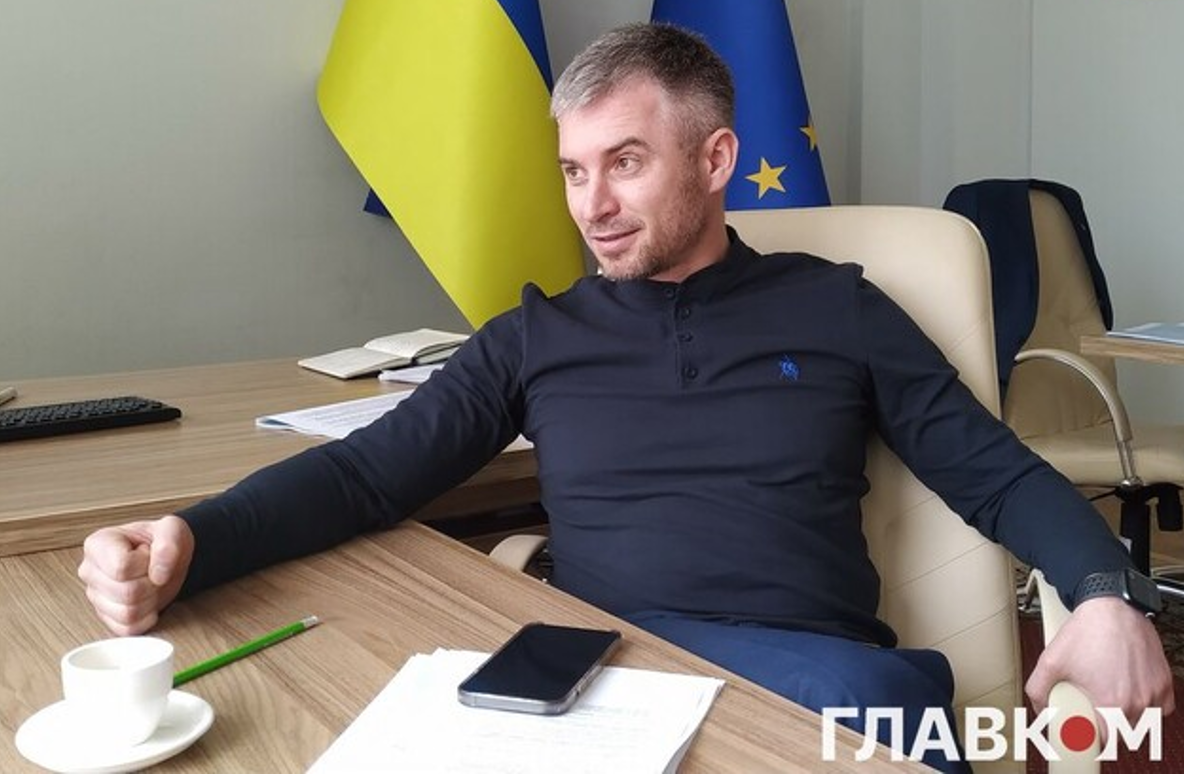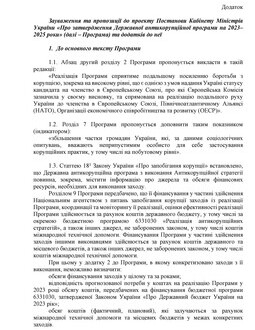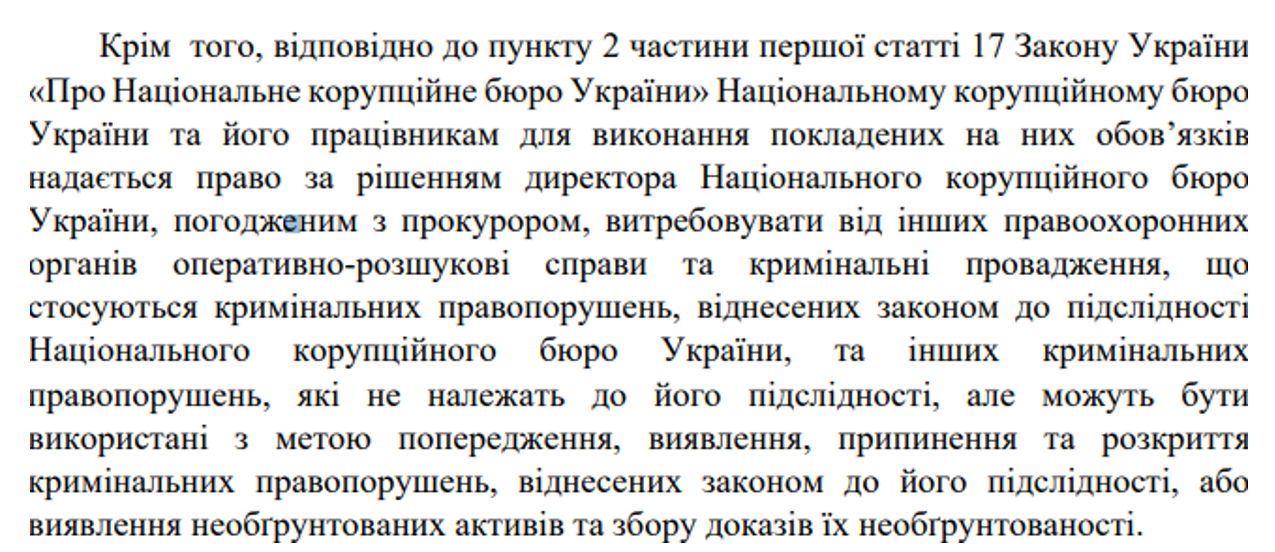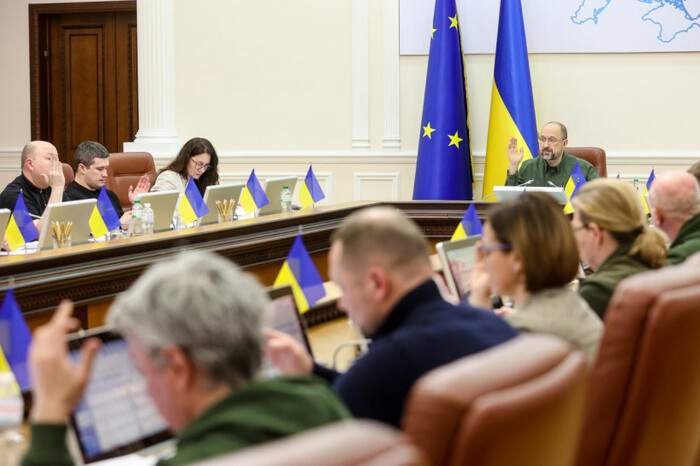





The government voted for the State Anti-Corruption Program, but immediately … began to put spokes in the wheels // Anti-corruption coup in Ukraine
The Cabinet of Ministers and Parliament are blocking the implementation of the anti-corruption program, which they themselves adopted
On April 5, a solemn presentation of the State Anti-Corruption Program for 2023-2025 took place at the Radisson Hotel in Kyiv. The document was approved by the decision of the Cabinet of Ministers a month ago. The event entitled “The Path to a Future Without Corruption: Step by Step Instructions” was attended by representatives of the government, the Office of the President, the Verkhovna Rada, and anti-corruption agencies.
Although recently the Council of Europe Group of States against Corruption (GRECO) acknowledged progress in preventing corruption and removed Ukraine from the black list of especially corrupt states, corruption remains the most acute problem for Ukrainians themselves. It is in the top three most serious national ills after the war and the high cost of living. In the latest social survey by Info Sapiens, 64% of Ukrainians complained about corruption. For business representatives, corruption is in second place among the worries – it worries 55% of respondents.
The “step-by-step instructions” for getting rid of this evil were compiled by the National Agency for the Prevention of Corruption, which actually prepared the Anti-Corruption Program. NAPC literally gnawed its adoption with its teeth and will now monitor its implementation.
“For the past six months, the government has been blocking acts prepared by the National Agency regarding anti-corruption policy,” stated Alexander Novikov, head of the NAPC, in a recent interview “Commander-in-Chief”. “I really hope that after the adoption of the State Anti-Corruption Program, this policy will change.”

The head of the NAPC, Oleksandr Novikov, does not hide the fact that in order to approve the Anti-Corruption Program, he had to fight against sabotage … of the government // Anti-Corruption Coup in Ukraine
But it is already obvious that the resistance that preceded the approval of the program will continue after it has started working. In particular, even some honored guests of the NAPC events are already putting obstacles to the implementation of the newly adopted document, although in words they declare their commitment to the anti-corruption cause.
At present, the government and parliament have joined forces in an attempt to make the Anti-Corruption Program a purely declarative document that simply will not fulfill its functions. What are the creative powers that be trying to pull off and what can they get out of it?commander-in-chief“.
Anti-corruption coup in Ukraine. Come in, it’s open!
The Cabinet adopted the long-awaited Anti-corruption program for 2023-2025 at its meeting on 4 March. Such his “decisiveness” was not least facilitated by the pressure of international partners, in particular, the states of the Big Seven. But immediately after this optimistic news, strange games began. It took the government about ten days to release the final version of the document. The progressive public reacted to such a delay very wary and not in vain.
After the official promulgation of the program on March 13, it turned out that the Cabinet of Ministers simply removed several norms that it liked from it. Thus, the rule on the application of the indicator of the specific weight of each anti-corruption measure to achieve a strategic result was removed from the program. The NAPC insisted that different indicators have different weights and be evaluated differently accordingly. For example, the implementation of one key indicator could be estimated at 50% of the completion of the entire task, and not so important – less. Now there is no such differentiation, and in order to understand the state of affairs in the performance of a particular task, one should wait until it is completed in full.
Another provision concerns the preparation of draft laws provided for by the Anti-Corruption Program. From this process, the Cabinet of Ministers excluded the stages of public discussion, coordination with interested bodies and legal expertise. The removal of these mechanisms can seriously complicate the further implementation of anti-corruption measures.
Anti-corruption program. What is this?
The State Anti-Corruption Program for the Implementation of the Anti-Corruption Strategy is a document that defines the rules, standards and procedures for detecting, combating and preventing corruption.
The program includes more than 1,700 activities in 15 areas to reduce corruption and promote virtue. In particular, in the field of legal proceedings, state regulation of the economy, customs and taxation, the public and private sectors of the economy, construction, land relations and infrastructure, the defense sector, healthcare, education and science and social protection.
National legislation defines three procedures for working with anti-corruption programs: monitoring, performance evaluation and periodic review of the program.
The executors of the State Anti-Corruption Program annually by February 15 and July 15 submit to the National Agency information on the status of implementation of the measures provided for by it.
The results of the implementation of the activities of the State Anti-Corruption Program for the implementation of the anti-corruption strategy of the NAPC publicly inform the Cabinet of Ministers annually until April 1, and also publish these results on its official website.
But these are not the government’s only surprises. Some mines were laid later. Thus, during the adoption of the program, Prime Minister Denys Shmyhal made an interesting remark: he noted that such an important document should be open to proposals and additions that can be submitted by both the heads of anti-corruption bodies, as well as parliamentarians and other stakeholders. Given that the combination of the government and “stakeholders”, according to the head of the NAPC, until the last moment hindered the adoption of the Anti-Corruption Program, one can imagine what the wave of these proposals and additions will lead to.
Announced dirty tricks
“The word of the prime minister that the State Anti-Corruption Program is a living, open document immediately alerted us and we began to expect some kind of dirty trick,” Andrei Vishnevsky, deputy chairman of the NAPC, admits in a conversation with the Commander-in-Chief. “We guessed what exactly this dirty trick could concern, and so it happened.”
Vishnevsky recalls: incomprehensible movements on the part of the government began back in February – at the stage when the draft anti-corruption program was finally approved by the government committee for submission to the Cabinet of Ministers. Then the prime minister sent a personal letter to the chairman of the Verkhovna Rada with a request that the parliament express its proposals to the draft resolution of the Cabinet of Ministers on approving the program.
“But the Verkhovna Rada has already spoken out on this issue, having approved the anti-corruption strategy for 2021–2025 by law,” Vishnevsky notes. – Thus, she not only instructed the Cabinet of Ministers to ensure its implementation, but also gave clear instructions on how to do it. The law says that the NAPC is responsible for the development of the Anti-Corruption Program, the Cabinet of Ministers is responsible for approval, and after approval, NAPC is also responsible for coordination, monitoring and evaluation. What is even clearer?

Deputy Chairman of the NAPC Andriy Vishnevsky believes that the Parliament has no right to submit proposals to the Anti-Corruption Program immediately after its adoption // Anti-Corruption Revolution in Ukraine
Further, this letter from Shmygal was sent to all committees and structural divisions of the Council’s apparatus, which took part in the collection of proposals. Subsequently, it became clear why such an initiative was taken. On March 14, the Cabinet of Ministers approved the government’s priority action plan for 2023. It contained an instruction from the NAPC to develop a draft amendment to the State Anti-Corruption Program, taking into account the proposals and comments of the committees of the Verkhovna Rada.
The parliament did not keep itself waiting with proposals – the agency has already received a letter signed by the first vice-speaker Alexander Kornienko, to which 26 pages are attached with the same summary proposals and comments from various committees and structural divisions of the parliament apparatus.

Anti-corruption coup in Ukraine
(click on document to view)
Although, due to misprints and errors, these amendments themselves, in turn, need to be amended: for example, in the document sent to the NAPC, deputies stubbornly call the National Anti-Corruption Bureau “corrupt”.

The deputies were in such a hurry to correct the mistakes in the Anti-Corruption Program that they added a bunch of their own // Anti-Corruption Coup in Ukraine
According to the logic of the Cabinet of Ministers, by May the NAPC should develop a draft of changes to the program and then coordinate it with all the bodies with which the initial draft was agreed. And there are more than a hundred of them!
In the NAPC, such initiative of the Cabinet of Ministers and people’s deputies is perceived as a planned obstacle to the effective implementation of the anti-corruption program. “Now we will have no time to actually organize the implementation of the program, and this will include the creation of a special information system for monitoring its implementation, approving the procedures for providing statistical information, coordination, monitoring and evaluation, and direct communication with more than 90 program executors who need to be explained how fulfill it,” Vishnevsky is indignant. “Instead, according to officials, we should study the proposals of parliamentary committees and develop a draft of any changes. That is, the Cabinet of Ministers imperatively indicates that we must move forward taking into account the opinion of the deputies.”

First Vice Speaker Alexander Kornienko attended the presentation of the Anti-Corruption Program, but signed 26 pages of amendments that could slow down its implementation // Anti-Corruption Coup in Ukraine
Anti-corruption revolution. Can’t stop the bike?
The fact that the Verkhovna Rada, after the adoption of the program, does not have the authority to correct something in it, does not really bother parliamentarians. But the Agency has enough leverage to demonstrate its own independence.
“Now the tactic is being tested – to take the NAPC “on the weak side,” Yaroslav Yurchyshyn, First Deputy Chairman of the Parliamentary Anti-Corruption Committee, assesses the situation. – The Cabinet of Ministers expects that the NAPC will take these proposals and try to rewrite the Anti-Corruption Program again, so that later it can be improved by a separate decision. Although the Cabinet in this case is a body that has only advisory functions. The NAPC, of course, can review the decision of the committees for adequacy and take some things into work without stopping the program. But there is no obligation for the Agency to make these changes. The Cabinet of Ministers could not refuse to accept the program and is now looking for opportunities to report less, but it all depends on the position of the NAPC and the activity of society.”
Director for Scientific Development of the Center for Political and Legal Reforms Mykola Khavronyuk explains the game around the Anti-Corruption Program by the unwillingness of the cautious government to quarrel with the deputies, who were thrown candy with proposals. But the expert compares these intrigues with futile attempts to stop a bicycle by sticking a small stick into its wheel.
“The Anti-Corruption Program has great immunity from cancellation, because society and international partners monitor its implementation,” Khavronyuk believes. – Despite the widespread opinion that donors support only public organizations, in fact, huge donor funds go to state bodies. Of course, everyone is looking for their own interest and wants to bargain for something: judges think about one thing, prosecutors about another, the Ministry of Internal Affairs about a third. But at the stage when the program has already been adopted, many have realized that the bidding is not going well and will try to sabotage it. This will also not be very successful, because constant monitoring will continue and assessments will be issued. Of course, there may be some pitfalls and difficulties that were not taken into account in the preparation of the State Anti-Corruption Program, in particular, those related to martial law and hostilities. But it will be necessary to separately prove the impossibility of carrying out one or another measure.
The National Agency for the Prevention of Corruption has the right to initiate a revision of the state anti-corruption program based on the results of monitoring and evaluating the effectiveness of the implementation of the anti-corruption strategy.
The anti-corruption program may be reviewed under the following conditions:
- if it is determined that the measures to eliminate the group of corruption risks are not effective enough;
- in connection with changes in legislation that affect the activities of the authority;
- when identifying new corruption risks or significant changes in the priority of corruption risks in the activities of the authority.
Under the NAPC, a Coordinating Working Group on Anti-Corruption Policy is being created as a consultative and advisory body, co-chaired by the positions of the Chairman of the NAPC and the Minister of the Cabinet of Ministers. The main tasks of this body are, in particular, the preparation of proposals for the formation and implementation of the state anti-corruption policy (including the improvement of the regulatory framework).
The Chairman of the Public Council under the National Agency, Ekaterina Butko, is sure that even that trimmed version of the adopted Anti-Corruption Program will be enough for three years of work. And its execution can be blocked by one thing – the failure of the bodies subject to monitoring to carry it out.
“For example, ministries can fight against the NAPC and say that they will start with the implementation of those measures that they consider the most important,” Butko suggests. — Here it is difficult to predict how it will be, because we have such a clear anticorrosive program for the first time. There are ministries that have accepted it completely – the Ministry of Health, the Ministry of Infrastructure, but there are also those who resist – the judiciary, the Office of the Prosecutor General, the Antimonopoly Committee, which generally said that it does not concern him, the Ministry of Digital Transformation had comments.
Anti-corruption revolution. Order punishment. Is it possible or not?
In addition to the paralysis of the implementation of the Anti-Corruption Program by constant “improvements”, there is also a risk of another kind – the actual absence in the NAPC of instruments of punishment for non-compliance and sabotage. Legal Advisor to Transparency International Ukraine Oleksandr Kalytenko recalls such a familiar mechanism for the NAPC as an instruction: it is laid down in the law on the prevention of corruption and is mandatory for implementation. The order is issued to the head of the relevant state body to eliminate violations of the law or bring the perpetrator to justice established by law. The NAPC quite actively used such a tool, in particular, with regard to top officials – they had to report on the results of its implementation within ten working days from the date of receipt. Penalties for ignoring the instructions are small – up to 5100 UAH. for a repeat violation. But failure to comply with the measures of the Anti-Corruption Strategy does not even provide for such a punishment.
“Even when the anti-corruption strategy was adopted last year, a good amendment was submitted at the profile committee of the Council. It concerned the possibility of making an order to the relevant head of the body by the NACP on the need to ensure the implementation of the measures of the Anti-Corruption Program and the Anti-Corruption Strategy, Kalitenko recalls. “Because now this mechanism only applies to violations of moral conduct, conflicts of interest or other violations of the law on the prevention of corruption. But the deputies rejected the amendment, allegedly due to the fact that the NAPC would abuse this right. Only a vague provision remained in the law that the head of the body is personally responsible for the implementation and implementation of the WCT. And what kind of personal responsibility is this – everyone interprets it the way they want.
The lawyer gives an example of the previous Anti-Corruption Program for 2021-2022, which contained almost the same liability clause. And he states that this document was never 100% fulfilled, and no one personally answered for it.
However, Andrey Vishnevsky, Deputy Chairman of the NAPC, believes that the Agency can still issue orders and draw up administrative protocols in case of non-compliance with the Anti-Corruption Program. He refers to the fact that the law on the prevention of corruption contains a rule that the measures of the program are obligatory for the implementation of state bodies. Accordingly, non-compliance with the program is equal to non-compliance with the law. Although the scope for the interpretation and fantasies of lawyers, if the cases go to court, remains here.
In addition to the tools of coercion to the implementation of the program, the Agency expects to kindly convince violators. And the developed public IT monitoring system, which will monitor in real time the implementation of measures by each body, will allow to influence them due to the pressure of civil society.
In any case, the NAPC categorically refuses to consider deputy proposals, since they consider the government decision, which is instructed to make changes to the program, null and void and unenforceable.
“The law clearly defines the procedure for making changes to the State Anti-Corruption Program and for good reason,” concludes Vishnevsky. – The program is protected by law, and this protection consists in the fact that there is a single mechanism and basis for making changes to the Anti-Corruption Program – based on the results of monitoring and evaluation conducted by the NACP. To understand how the program works and what may need to be taken into account or corrected in it, at least some period should pass. Therefore, unfortunately, all this does not look like the Prime Minister personally and the Cabinet of Ministers as a whole have real political will to implement the program.”
Of course, the NAPC with its autonomous powers can signifi- cantly ignore the wishes of the deputies. But then there is a danger of a clinch: the parliament will simply sabotage the adoption of a number of bills, and the Cabinet of Ministers will sabotage the adoption of legal acts necessary for the implementation of the Anti-Corruption Program. Even despite the fact that these projects are aimed at implementing the strategy and program, which was approved by the Parliament and the Cabinet of Ministers, respectively. But if you need to speak up and drag out some issue, Ukrainian politicians have no equal in this. Moreover, they only need to wait until the NAPC enters a period of turbulence. The term of office of the current head of the Agency, Alexander Novikov, expires on January 10 next year.
Pavel Vuets, translation Skeleton.Info









